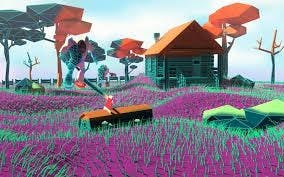The Metaverse Doesn't Really Exist But It's Huge
No one really knows what it is, and prior "versions" have foundered. But the metaverse was one of the biggest stories of the year.
By: Brady Dale • Loading...
Research & Opinion
Big Story 2021: This article is part of our Year in Review series.
One thing the metaverse is not: whatever Mark Zuckerberg is building. That’s all we actually know. Whatever it is won’t be coming out of Facebook’s HQ.
Beyond that, though, who knows what the metaverse truly is, though? There’s a disconnect between how those deep in the crypto industry conceptualize the metaverse right now and how the general public imagines it. As an example, OpenLaw staffer and member of several DAO’s, Priyanka Desai, tweeted in August: “Dare I say Discord is crypto’s killer app.” Which orthogonally supports the point: the metaverse is the biggest story about something that doesn’t really exist yet.
2-D Environments
We were promised a complete and immersive virtual world like the one Neal Stephenson described in 1992’s novel, Snow Crash, but what we got were Discord servers. At least so far, and while that’s compelling for folks who have manage to buy a piece of what’s to come that they believe will be worth a lot when a true metaverse kicks in, it’s not going to wow the regular public if they come to check it out and find a lot more message boards.
When the lumpen hear “metaverse” they think virtual reality, but here in crypto folks are embracing 2-D environments that look like they came out of an old Nintendo Entertainment System, browser-based worlds, some VR, some AR and — as we said — this argument that even the text-based forums are part of the metaverse.
We’re at the builder stage in this story. So we’ve got LOOT, for example, which is a builder-verse (for now). It’s a list of items that’s on the way to becoming games. That’s an inverted process, and it’s understandable why it would excite the technically adept. There are truly participatory art projects like Jay Pegs Auto Mart that invite owners to drive value to their pieces by accelerating hype for the larger enterprise. These are both broad, permissionless, world-building exercises with fuzzy edges. And speaking of JPEGs, nothing blurs the lines between digital and normal reality more than the fact that it’s possible to borrow a lot of money against one.
DappRadar Exclusive Report: The Metaverse May be an Old Idea But It’s Just Getting Started

DappRadar Exclusive Report: The Metaverse May be an Old Idea But It's Just Getting Started
After 30 years n gestation, the metaverse is finally emerging with citizens, economies, currencies, and millions of users.
These strange new ways of using the internet to enable people to make things together reflect how the builders think of the metaverse today, but it’s only going to go mainstream when the masses looking for fresh distractions vibe with it. Sure Bill Gates thinks all our business meetings will move there and art museums are popping up across the various online spaces, but the metaverse doesn’t feel like the web did after social networking came along, that is: this moment where we all went, “Ah-ha, yes, this is what this machine is for.”
And yet the true believers are filled with its excitement and promise. There’s a Zillow for virtual land, already. Mortgages for such land or buildings on it can’t be far behind. Of course, major brands are already setting up outposts in virtual worlds, because God forbid anything online lacks advertising. Indeed, InifiniteWorld announced plans to go public at $700M valuation in a bid to help brands leverage metaverse consumers at year’s end.
Metaverse Unicorns
And The Defiant saw ads for Upland, a virtual world that runs on the EOS blockchain, on the NYC subway last week, which was unsettling.
But this metaverse narrative ends in one of two outcomes: there really is a robust ecosystem in virtual reality or something that approximates it and that’s really what everyone calls the metaverse.
Or, this generation of virtual reality fizzles, as virtual reality has been doing again and again since roughly the early ’90s.
Either way, by 2023, no one will still be calling Discord servers the Metaverse. Discord servers are Discord servers. The metaverse has unicorns in the simulated sky. It’s not the same. The everything-that-foments-community-on-the-internet-is-the-metaverse cope will pass when and if this thing works and when and if we know what this story is (or when and if no one cares).
“Virtual worlds have the opportunity to become the ‘social layer’ for the metaverse,” tweeted Andrew Steinwold of the virtual world venture fund Sfermion. “They need to make every NFT OPERABLE in-world.”
Whatever happens, the metaverse in 2021 has been a rhetoric laden opening to a story with an ill-defined setting, but hopefully its narrative hook will sink in sometime in 2022.
Advertisement
Get the best of The Defiant directly in your inbox 💌
Know what matters in Web3 with The Defiant Daily newsletter, every weekday
90k+ investors informed every day. Unsubscribe anytime.